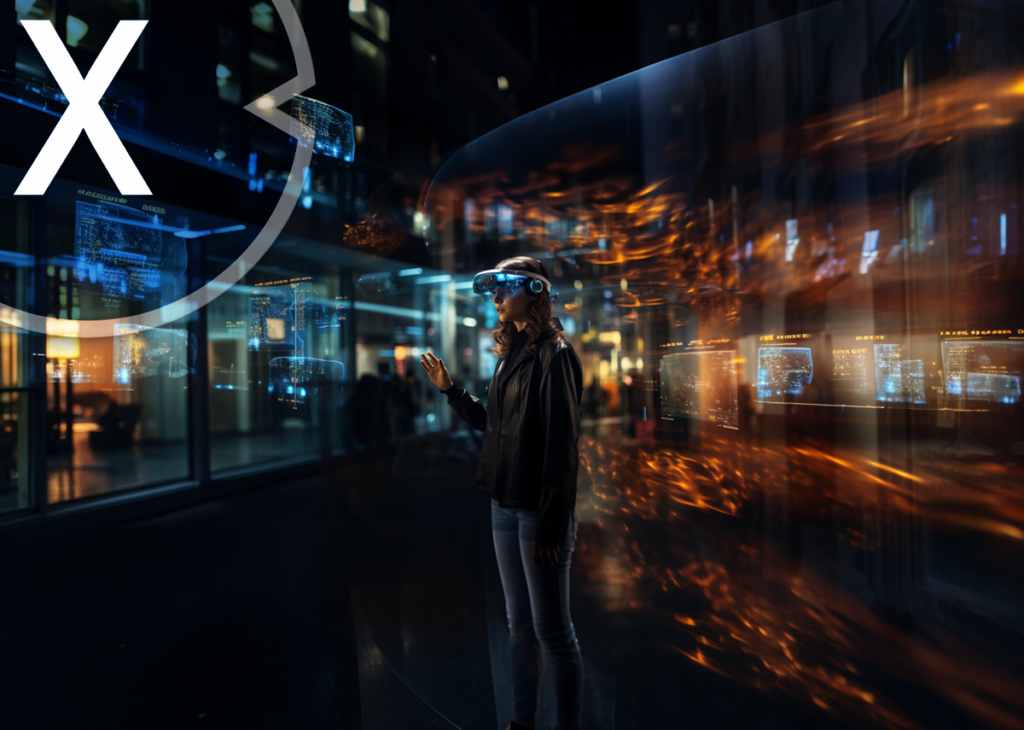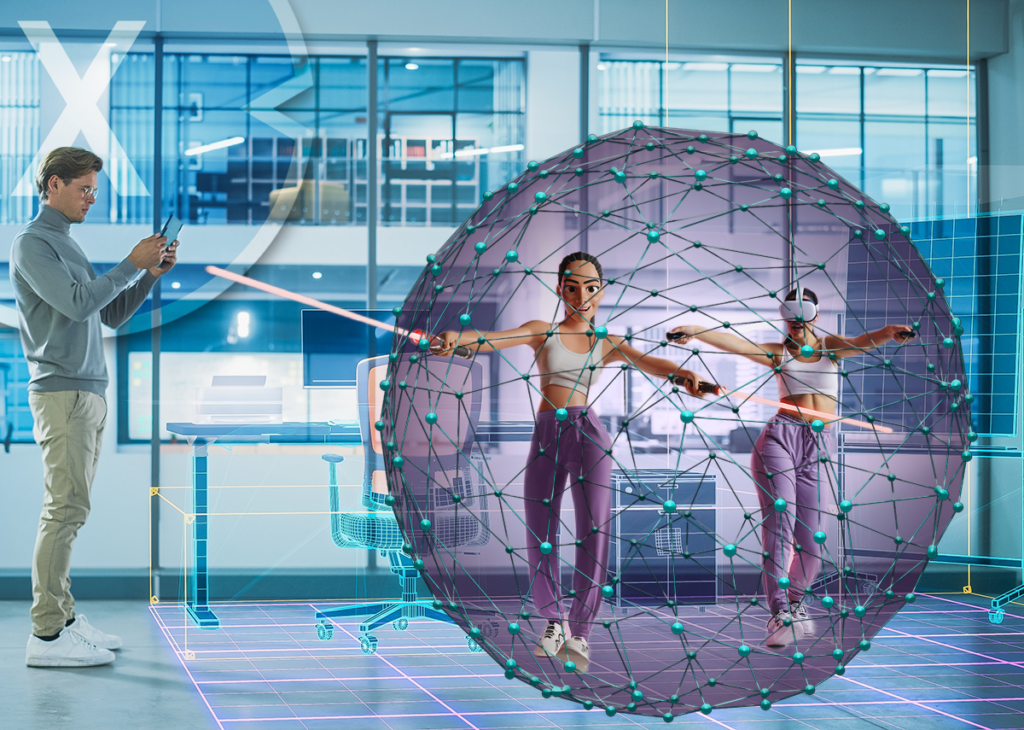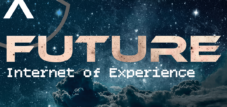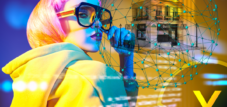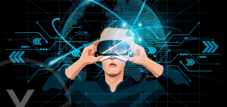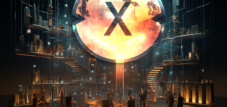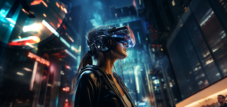Metauniverse – a constructed reality? Metaverse Philosophy – The Truman Show, The Matrix and the Brain in a Tank Thought Experiment
Language selection 📢
Published on: November 18, 2023 / Update from: November 18, 2023 - Author: Konrad Wolfenstein
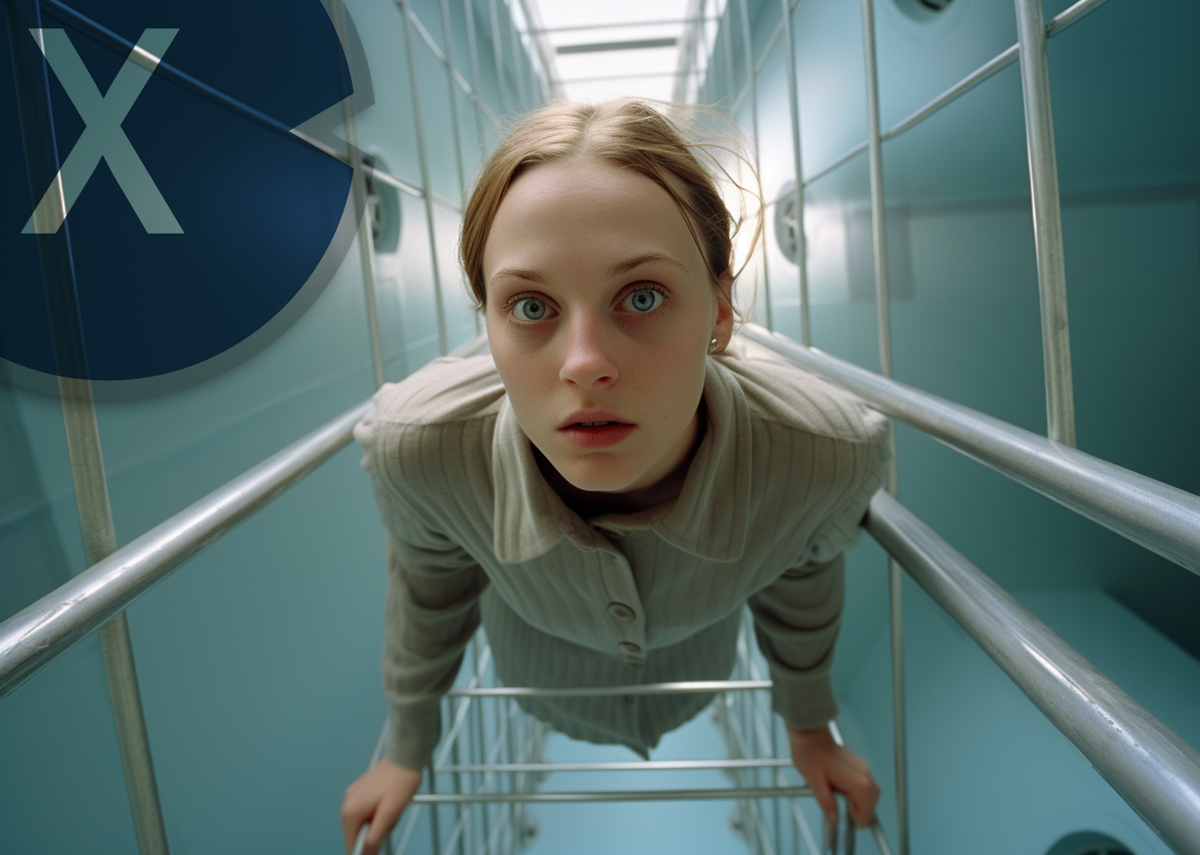
AI & XR 3D Rendering Machine: Reality or Illusion? The philosophical connection between our universe and the Metaverse – Image: Xpert.Digital
Preview changes (opens in new tab)
🎬 The 'Reality Show' Illusion: Are We Living in a Simulation? 📚🌌🕹️
🤔 Philosophical roots of the simulation hypothesis
The idea that the universe - and thus also our world - is a kind of large -scale “Truman Show” is immediately causing associations with the film “Die Truman Show”, in which the protagonist unknowingly lives life in an artificially created world. However, this idea is not only pure fiction, but also interweaves with philosophical mind games such as the thoughts of the “brain in the tank” and the concept of simulation theories.
🎥 The Matrix as a metaphor of modern technology
The idea of a “Truman Show” world also finds a strong response in the concept of the matrix, as it is shown in the film of the same name. In “The Matrix”, people live within a completely simulated reality that was created by artificial intelligence. People are not aware of this and believe that their life would be real. The film plays with the premise that our sensory perceptions and our minds could deceive us so that we no longer recognize the true reality.
🌐 The metaverse: steps towards a “truman show” reality
These ideas raise fundamental metaphysical questions, which are still becoming more and more relevant - at a time at a time when technologies such as virtual reality (VR) and the developing meta -verses. Metaverse is a name for a coherent virtual world that is made accessible by people by the Internet. This includes immersive experiences made possible by VR, augmented reality (AR) and other technologies. So one could argue that we are already on the way to our own “Truman Show” when you consider how integrated and dependent we have become on digital technologies and simulated environments.
💭 Solipsism and reality in the digital era
These futuristic scenarios also touch on the philosophical concept of solipsism, which is about the question of whether something can exist outside of one's mind. In our modern digitalized world, where VR technology allows us to immerse ourselves in practically created realities, the question of differentiating reality from fiction is becoming increasingly complicated. By moving in digital worlds, we can essentially create our own reality that is subject to our will.
🤖 Technological progress and the question of true existence
If we accept the “Truman Show” as a metaphor for ignorance of the true nature of our existence, then the metaverse may force us to deal with the possibility of a reality constructed by us. In a way, this is in line with the philosophical considerations of René Descartes, who set up his famous thesis “Cogito, Ergo Sum” (“I think, so I”) and thus postulated the only undeniable fact of thinking and thus his own existence.
👤 Digital identities and the search for the self
Furthermore, the concept of the Metaverse expands our idea of identity and self. Avatars – our digital selves – offer us the opportunity to explore and express aspects of our personalities that may be hidden or suppressed in physical reality. But they also ask questions about authenticity and the meaning of experiences. Is an experience less real if it takes place digitally? This question becomes more pressing as the boundaries between physical and virtual reality continue to blur.
🔮 Future social and ethical challenges
In an increasingly digital and interconnected world, the question of what reality really means is becoming increasingly complicated. While Elon Musk and others have expressed the idea that we may be living in an advanced simulation, we lack definitive evidence to confirm or refute this, much like Truman Burbank had no definitive way to determine whether his world was real until he began to look behind the facade.
🔐 Data protection and property rights in virtual space
A consideration of the Metaverse and its impact on our understanding of reality inevitably leads to social and ethical considerations. Issues such as data protection, manipulation and the psychological impact of such integrated virtual environments are becoming increasingly relevant. Who owns virtual reality? How does it affect our mental health? What social norms and rules apply within these new realities?
🌟 Reality in the age of simulation
The concept of a “Truman Show” world in the context of the matrix and the meta-verse opens up numerous discussions about the nature of reality, the nature of human consciousness and the role of technology in our society. With the progress of the VR and AR technologies and the expanding meta-verses, we may get closer to a point at which the distinction between artificial and natural reality is not only philosophical, but also practically irrelevant. It remains a fascinating and at the same time worrying idea to what extent our reality is influenced, influenced or even controlled - be it by other people, artificial intelligence or even through our own decisions within digital worlds.
📣 Similar topics
- 🧠 The “Truman Show” world and the concept of reality
- 🌐 The Metaverse: The fusion of digital and physical reality
- 🎮 The Matrix and the illusion of simulated reality
- 🌌 Simulation theories and the question of our existence
- 💡 The limits of perception and consciousness: Brain in a tank vs. Truman Show
- 🌐 The Metaverse: A virtual reality for everyone
- 🤖 Identity and Self in the Metaverse: Avatars as Digital Manifestations
- 🤔 The definition of reality in a digitalized world
- 🔒 Data protection and the ethical challenges of the metaverse
- 🧠 Consciousness in digital worlds: authenticity and experiences in the metaverse
#️⃣ Hashtags: #Reality #Metaverse #GehirnImTank #Simulationtheories #Identity
🧠💭 Metaverse Philosophy: The New Dimension of Reality - The Brain in a Tank Thought Experiment
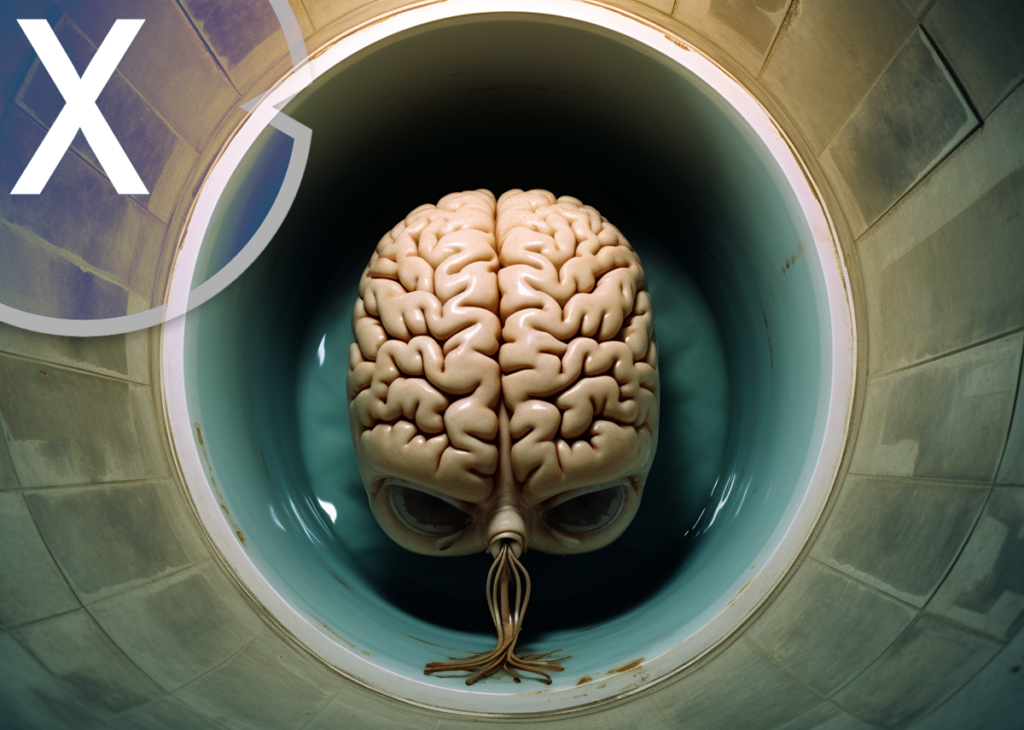
AI & XR 3D Rendering Machine: Metaverse Philosophy – The Brain in a Tank Thought Experiment – Image: Xpert.Digital
🤔💡 Philosophical reflections
Let's imagine the Metaverse - a complex, computer-simulated world that expands or even removes the boundaries of reality. In this virtual existence, everything is possible, from lifelike everyday experiences to the most fantastic adventures. But with all the advances in the digital world, a philosophical question arises that has fascinated humanity for centuries: How can we be sure that our perceived reality is also the actual reality? This question leads us to the classic thought experiment of the brain in a tank.
🧠🔮 The Brain in a Tank Thought Experiment
The brain-in-a-tank thought experiment, introduced by philosophers like Hilary Putnam, allows us to examine our perception of reality in greater depth. The premise is simple yet disturbing: What if our brains were floating in a nutrient solution outside our bodies while all of our sensory perceptions were simulated by a sophisticated computer? Could we ever say with certainty that this is not our current reality?
🕶️🌌 Virtual Reality and the Metaverse
This consideration takes on a completely new dimension in the age of the metaverse and advanced virtual reality (VR). If VR technology continues to advance rapidly and simulated worlds are almost indistinguishable from reality, how far is the leap to a fully metaverse existence in which our consciousness may transition entirely into a digital reality?
🤖🛸 Existence in the digital age
If you look at the Metaverse not just as an extension of our reality, but as a platform for entirely new forms of existence, fascinating ethical, philosophical and existential questions open up. It is no longer just about whether what we experience is real or virtual, but also about the impact of these experiences on our self-image and the relationship between our mind and the physical body.
🎭🚀 Identity and experience
In metavers, we could theoretically lead an infinite number of lives, accept a wide variety of identities and gain experience that would be impossible in the physical world. The philosophy of pure materialism, which says that only the physical world is real, is challenged by these new digital dimensions. What does that mean for our understanding of “reality”?
🔄🤝 Social impact
The influence of the Metaverse could also reach deep into the social structure of our society. What will be crucial is how we deal with questions of equality, freedom and the construction of reality. New spheres for social exchange, education, work and leisure are emerging. How will these experiences change our perception of closeness, community and interpersonal relationships?
⚖️👾 Philosophical challenges in practice
The Metaverse also presents very practical philosophical challenges. Let's consider the question of responsibility: If everything that happens takes place in a computer-generated world, then who is responsible for the actions within that world? And what will law look like in a world that cannot be physically grasped but still has real economic, social and emotional consequences?
💭🌐 Meaning of the thought experiment
The brain-in-a-tank thought experiment is therefore more than just a philosophical curiosity; it is a useful starting point for exploring the potential implications of the Metaverse for our understandings of reality, identity, and humanity.
📣 Similar topics
- 🌐 The Metaverse: An Augmented Reality?
- 💭 The brain in a tank: How safe is our reality?
- 🕹️ Metaverse and Virtual Reality: Where is the limit?
- 🖥️ Metaverse Existence: When Reality Goes Digital…
- 🤔 Where does reality end and the metaverse begin?
- 🌌 Metaverse: A new dimension of existence?
- 🌍 The Metaverse: Implications for Ethics and Philosophy
- 🧠 Identity in the Metaverse: How many lives are possible?
- ⚖️ Responsibility in the Metaverse: Who is liable for actions?
- 🗣️ The Metaverse: New impulses for social relationships?
#️⃣ Hashtags: #Metaverse #VirtualReality #GehirnImTank #Existence #Identity
🌐🔄 Metaverse and Reality: A fusion of worlds
🤖🌀 AI and autonomy in the metaverse
This particular metaverse penetration of virtual and physical realities is also changing the way we communicate, interact, and even perceive ourselves as individuals and as a society. The Metaverse may be able to overcome physical limitations by allowing people to interact through avatars that are not bound by the laws of the physical world. This has the potential to enable a whole new level of expression, but could also lead to alienation from our natural selves.
🎭🥽 The new “Truman Show” of the digital era
The discussion about a “Truman Show” continues within these new realities. In a world in which user activities, preferences and interactions can be analyzed and manipulated by algorithms, we have to ask ourselves to what extent we are the directors of our own life experiences. Is life in the meta -verse less predetermined than Truman Burank's life experience, or are we just at the mercy of the more subtle influence of algorithms?
🧠👾 The influence of AI on self-image in the Metaverse
The increasing influence of artificial intelligence (AI) contributes to these questions. AI systems have the potential, the way we learn, work and play, revolutionize, but also how we understand ourselves. By outsourcing the design of our digital environments to KIS, we could unknowingly give up control over our own “show”.
👀📡 Ethics, Surveillance and Privacy in the Metaverse
The ethical implications of such a shift are significant. Surveillance and privacy are becoming critical issues in a world where almost every aspect of our lives could be digitally tracked and potentially used or abused by companies or governments. The paranoia that Truman Burbank felt in his artificially created universe could become a real concern for the citizens of the Metaverse.
🌐🎮 Escape into virtual realities: Sustainability and social cohesion
The increasing escape from reality into virtual worlds also raises questions about the sustainability of this way of life and its impact on the social structure and interpersonal relationships. Is a life in a virtually perfected world, which may conflict with actually having relationships, learning empathy and experiencing direct, tangible experiences, desirable?
📚💡 Education in Transition: The Metaverse as a Teacher
Education could also be profoundly changed by the metaverse. It offers potentially revolutionary possibilities for personalized learning, augmented reality experiences and access to infinite information. But at the same time, there is a risk of a growing gap between those who have access to these advanced technologies and those who have to do without them - a digital divide on a whole new level.
🚪🌌 The Choice of Reality: Stay or Go?
After all, the long -term consequences of shifting large parts of our lives must also be considered in virtual spaces. Like Truman at the end of “Die Truman Show”, we could at some point face the choice whether we remain in a carefully curated and possibly restrictive reality or choose the unknown of a reality outside the simulation - if we are able to differentiate between the two.
🎥👁 Films as a mirror and warning of a new reality
In such a scenario, films such as “Die Truman Show” and “The Matrix” could be understood less as a mere entertainment or thought experiments, but as a forerunner or even warnings of a future in which the limits of reality are not only blurry, but may even be irrelevant. While we are on the way to this fascinating and potentially frightening future, the question arises how we can preserve our humanity and ensure that we become unknowingly protagonists in our own unreal "show".
📣 Similar topics
- 🌐🔄 Metaverse and Reality: A fusion of worlds
- 🤖🌀 AI and autonomy in the metaverse
- 🎭🥽 The new “Truman Show” of the digital era
- 🧠👾 The influence of AI on self-image in the Metaverse
- 👀📡 Ethics, Surveillance and Privacy in the Metaverse
- 🌐🎮 Escape into virtual realities: Sustainability and social cohesion
- 📚💡 Education in Transition: The Metaverse as a Teacher
- 🚪🌌 The Choice of Reality: Stay or Go?
- 🎥👁 Films as a mirror and warning of a new reality
#️⃣ Hashtags: #Metaverse #AI #self-understanding #ethics #surveillance #data protection #sustainability #socialcohesion #education #realitychoice
🌐🤖 Challenges of Humanity in the Metaverse
🚀 Ethical limits of AI
In a broader sense, the advance into the metaverse could even challenge our conception of humanity. With increasing use of artificial intelligence and algorithms to control experiences, ethical limits could also blur. In this context, the idea of artificial intelligence, which plays a central role in “The Matrix”, is of particular importance. AI will not only be able to form our experiences, but also to predict and influence our behavior. Digital worlds, similar to the reality experienced by Truman Burban, could be controlled and manipulated from the outside, while we think they still have control over it.
💞 Authenticity of relationships
This progression also raises questions about the authenticity of relationships and human bonds. As we spend increasing amounts of time in artificial environments where each participant may wear a digital façade, how can we build true intimacy and trust? Truman Burbank discovered that his interpersonal relationships were superficial and staged. As we enter the age of the Metaverse, these questions of authenticity and trust may become the front lines in the battle for our human connection and understanding of community.
🔐 Privacy in the digital age
Furthermore, the metaverse could negotiate the value of privacy. Privacy is actually not in “Die Truman Show” for the protagonist, since each of his actions was intended for the audience. In a world where our digital footprints can be permanently saved and analyzed, the protection of privacy could be one of the most important moral battles of the 21st century. The ability to withdraw and be free from surveillance could become a luxury in a digitally permeated universe that may not everyone can enjoy.
⛓️ Concept of free will
The concept of free will is also put to the test if you consider the opportunity to live in a world dominated by technology or even technocracy. If our decisions and preferences of machine learning can be influenced, how much of what we choose is our own choice? In “Die Truman Show”, Truman's alleged freedom was an illusion, orchestrated by his creator Christof. In the real world it could be the designers of algorithms and AI systems that conduct our “shows” without seeing it.
🧠 Psychological effects
Finally, there is the psychological component to consider. The human psyche is not necessarily designed to move between multiple levels of reality, and the constant shift between digital worlds and the physical world could have unpredictable mental and emotional effects. Truman Burbank experienced a tremendous identity and reality shock when he learned that his entire life was a lie. What types of psychological effects might we experience if our boundaries of reality are constantly challenged and renegotiated?
🌐🕶️ The “Truman Show” of our reality in the metaverse
The idea of our universe or our everyday world as a “Truman Show”, especially in the context of the matrix and the emerging meta verse, brings out an abundance of topics. It questions the nature of reality, the influence of technology on our human experiences and the value we attach freedom, authenticity and privacy. While the meta -seven exciting new possibilities promises, it also requires a deep reflection on the consequences of its influence on our life and what it means to live in a world in which the differences between show and reality will soon no longer be so clear.
📣 Similar topics
- 🌍 The Challenges of the Metaverse: Technology vs. Humanity
- 🤖 Artificial intelligence and ethical boundaries in the metaverse
- 💑 Authenticity and trust: relationships in virtual space
- 🔒 Privacy in the Metaverse: Between Surveillance and Freedom
- 🗽 The battle for free will in the technologically dominated metaverse
- 😵 The psychological effects of constantly changing reality in the Metaverse
- 🌌 The Nature of Reality: The Metaverse as Truman Show
- 🚀 The Metaverse, the Matrix and the Evolution of Human Experiences
- 🎭 Between Show and Reality: The Value of Freedom and Authenticity in the Metaverse
- 👥 The Metaverse: Impact on Community and Human Connection
#️⃣ Hashtags: #Metaverse #Technology #Authenticity #Privacy #FreeWill
🌐🎭 Discussing a Metaverse as an Expanded 'Truman Show'
🏗️👩💻 Potential for creativity and business
The Metaverse opens the doors to virtual businesses, marketplaces and artistic stages where people can showcase their talents and skills in ways that might not be possible in the physical world. This new reality could expand individual freedoms and lead to a democratization of creativity by offering a platform to all people - regardless of physical location or social status.
⚠️💻 Risks in the digital world
At the same time, such unregulated digital spaces pose risks of information control, fake news and digital manipulation, especially when these virtual experiences become indistinguishable from physical reality. The ability to distort facts and construct narratives could be even easier and more seductive in virtual worlds. Just as Truman Burbank's reality was manipulated, narrative constructs in the Metaverse could influence our view of the world and unnoticed advance political, social or economic agendas.
👨⚖️ Responsibility and regulation
The responsibility for dealing with these challenges lies with the developers of these technologies, legislators and society as a whole. Technological innovations, especially those that change our concepts of reality, require regulatory frameworks, ethical standards and educational programs. There will be discussion about what measures can be taken to ensure that the Metaverse remains a space of positive human development, rather than a dystopian trap in which people are stripped of their autonomy.
🤔🌐 Debate about consciousness and existence
After all, the possibility that our world is like a “Truman Show” requires a new understanding of consciousness and existence as a whole. While Truman Burank ultimately broke out of his fake world, we could, faced with the complexity of the meta -verse, find that there is no clear “door to the real world” through which we can step through. Instead, we may have to learn to navigate within several layers of reality and to preserve our own version of authenticity and truth.
🌟🧭 Navigating the new reality
In such times, a self -reflected and conscious approach is required in order not only to meet the challenges of the metaverse, but also to take advantage of its numerous opportunities. Perhaps the biggest lesson that we can draw from “Die Truman Show” and “The Matrix” is that you are always looking for your own way regardless of the reality in which you are in your own way and the question arises: What does it mean to really live and choose what kind of world we want to exist in?
🤖💭 The Metaverse as a vision of the future
The metaverse is still in its infancy, but it already invites us to expand the limits of our understanding of reality, identity and community. In dealing with these questions, in which games with the possibilities and also in caution of potential pitfalls, it will be shown whether the meta verse becomes an expansion of our world that contributes to real human progress, or whether it represents a modern “Truman Show” in which we run the risk of losing ourselves.
📣 Similar topics
- 👥 The Metaverse: A space for individual freedom and creative expression
- 🌐 The Metaverse as a platform for virtual companies and economic opportunities
- 🎭 The Metaverse: A new stage for artistic talent and skill
- 🔎 The risks of unregulated digital spaces in the Metaverse
- 📰 Fake news and digital manipulation in the metaverse: challenges and solutions
- ⚖️ Regulatory framework in the Metaverse: The responsibility of the developers
- 🧠 The Metaverse as a challenge to our understanding of consciousness and existence
- 🌍 The Metaverse as a democratized space of creativity
- 🤔 Authenticity and Truth in the Metaverse: Navigating Multiple Layers of Reality
- 🌱 The Metaverse as an opportunity for human progress and self-reflection
#️⃣ Hashtags: #Metaverse #RealityConcepts #Authenticity #DigitalRisks #CreativityPlatform
🌐🎮 The further development of the Metaverse and its impact on work and leisure
🔍 A new era of work and play
The further development and distribution of the meta -verse could also lead to a profound change of our work and leisure. While Truman Burank's life followed a strict script on the show, the boundaries between work and play could blur in metavers. Many futuristic visions predict a world in which physical presence for work is less and less important and remote work in virtual offices on the norm. This development, which has already been accelerated by the COVID-19 pandemic and the increase in home office and virtual meetings, could have progressed in the meta verse. This would understand the way we “work” and “live”, fundamentally redesign and raise new questions of work-life balance.
🔄 Metaverse as an escape or a trap?
In a world in which the separation of work and leisure is becoming increasingly difficult, metaverse could offer an escape from reality or lead to a further mixing of private and professional life. There is a risk that the meta -verse is not only a place for relaxation and pleasure, but also becomes an extended workbench where we are always “on”, without real breaks or shutdown options. At the same time, this new way of interaction in meta -verse offers significant opportunities for remote -controlled teamwork, global cooperation and access to a wider range of work options, regardless of geographical restrictions.
🧠 Psychological effects of the digital world
However, the psychological effects of constant connection and immersion in digital worlds must be carefully considered. There are already concerns about the impact that social media and constant connectivity is having on our mental health. These effects could be magnified in the Metaverse, where experiences could be even more immersive and engaging. The ability to move between different levels of reality while maintaining one's mental health and a sense of connection with the physical world is becoming a key skill in an increasingly digitalized future.
⚖️ Digital ethics and social governance
All of these considerations require that we can control and steer technological development instead of being driven by it. The call for “digital ethics” is therefore getting louder, and the creation of guidelines and control mechanisms that prevent power abuse and ensure the rights and the well -being of the users will be essential. The digital gap, data protection concerns and the need to promote digital competence are just a few of the many challenges that we have to face.
🔮 The Truman Show as a metaphor for the Metaverse
Finally, the concept of a “Truman Show” as a prism, through which we look at the meta verse, offers a wealth of areas of possibility and risks. Whether we move towards a future in which we are the authors of our own digital narratives or in which we are caught in an illusion created by other illusion is a question of the individual and collective decision. It will depend on how we, as a society, control technological progress, how involved and vigilant we as individuals in our digital life are and how we tackle the moral and ethical questions associated with this new reality.
💡 Our responsibility in the virtual age
Finally, it is up to us to understand our role in the Metaverse and take active steps to ensure that our virtual future reflects the human values and principles we value and seek to preserve. At a time when the boundaries of reality appear more flexible than ever before, consciously navigating these new dimensions is crucial to ensuring both individual freedom and collective well-being.
📣 Similar topics
- 🌍 The impact of the Metaverse on work and leisure
- 🔮 The fusion of work and play in the Metaverse
- 💼 Metaverse: The future of remote work
- 🌐 Heading into the Metaverse: Challenges of work-life balance
- 😰 The psychological effects of the Metaverse: opportunities and risks
- 🧠 The Effects of the Metaverse on Mental Health
- 🌈 Between the virtual world and reality: The challenge of connection
- 🤝 Remote teamwork: opportunities and possibilities in the metaverse
- 🚦 the need for a “digital ethics” in the metaverse
- 🛠️ Control mechanisms and guidelines in the metaverse: user rights and abuse of power
#️⃣ Hashtags: #Metaverse #WorkandLeisure #WorkLifeBalance #MentalHealth #DigitalEthics
🗒️ Xpert.Digital: A pioneer in the field of extended and augmented reality

Industrial & B2B Business Metaverse: Reduce costs with XR technology for photorealistic product images (XR 3D rendering machine)
XR technology offers a superior solution for creating photorealistic images and allows companies to free themselves from the expensive fees of external media agencies. It is common knowledge that media agencies charge high costs to create such images as it requires expertise, special software and collaboration with various experts.
More about it here:
We are there for you - advice - planning - implementation - project management
Xpert.Digital - Pioneer Business Development
Smart Glasses & KI - XR/AR/VR/MR industry expert
Consumer metaverse or meta -verse in general
If you have any questions, further information and advice, please feel free to contact me at any time.
I would be happy to serve as your personal advisor.
You can contact me by filling out the contact form below or simply call me on +49 89 89 674 804 (Munich) .
I'm looking forward to our joint project.
Xpert.Digital - Konrad Wolfenstein
Xpert.Digital is a hub for industry with a focus on digitalization, mechanical engineering, logistics/intralogistics and photovoltaics.
With our 360° business development solution, we support well-known companies from new business to after sales.
Market intelligence, smarketing, marketing automation, content development, PR, mail campaigns, personalized social media and lead nurturing are part of our digital tools.
You can find out more at: www.xpert.digital - www.xpert.solar - www.xpert.plus



